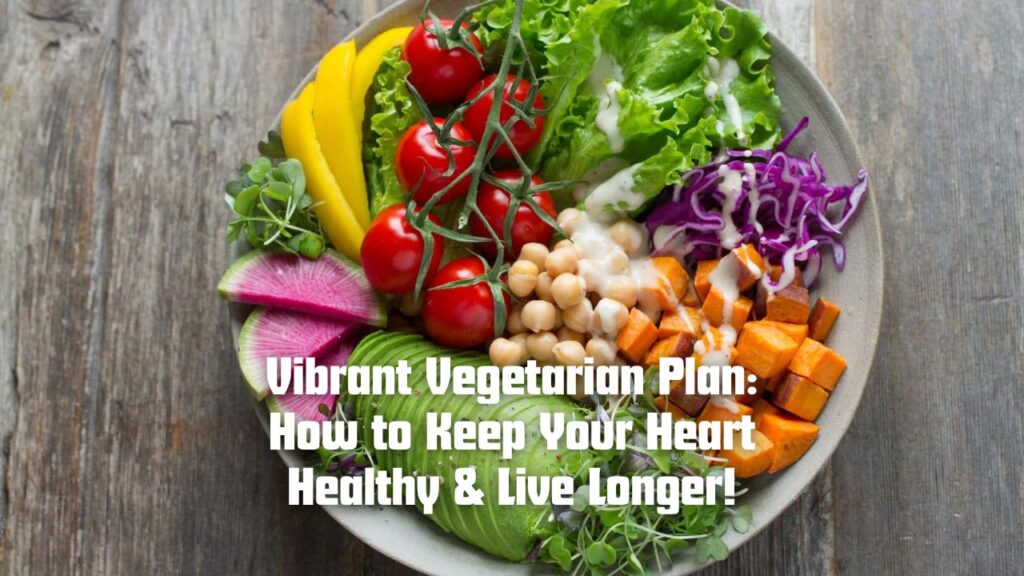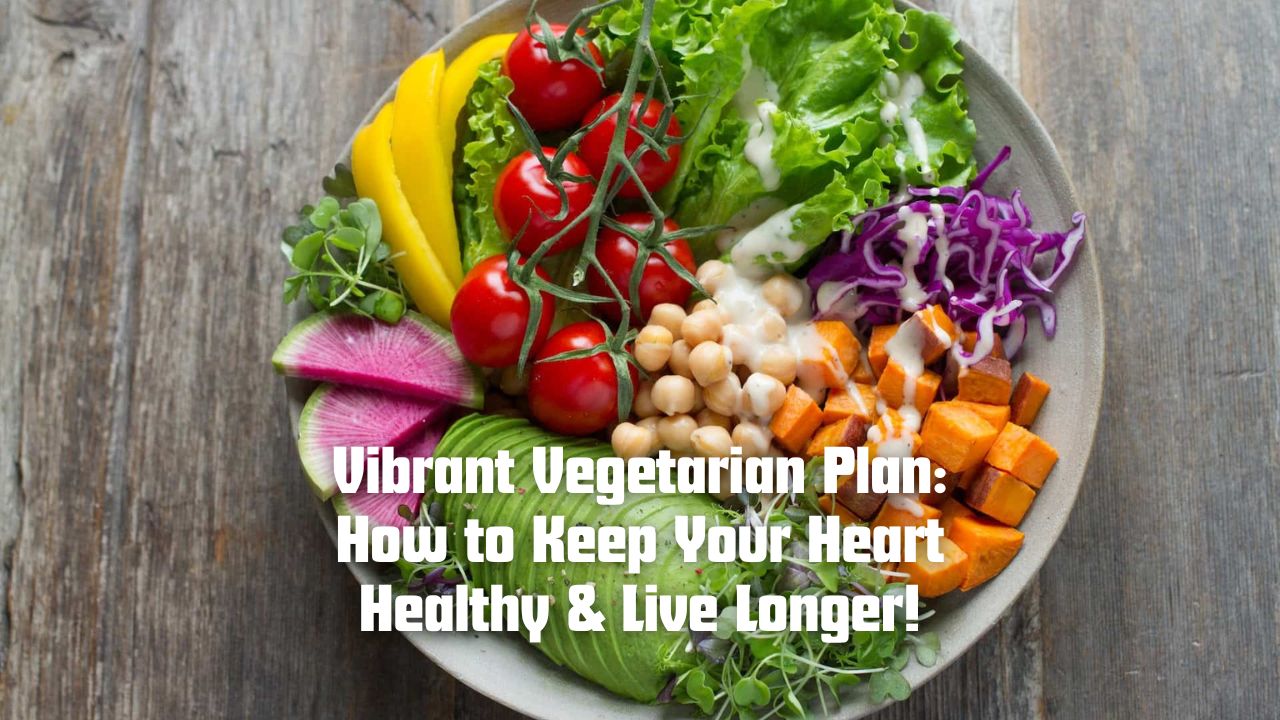Vibrant Vegetarian Healthy Heart Plan
A healthy heart is the key to a long and active life. Your diet plays a major role in keeping your heart strong. A vegetarian diet is one of the best ways to keep your heart healthy. It is rich in fiber, vitamins, and antioxidants. It also helps to lower cholesterol, blood pressure, and heart disease risk.
In this article, we will explore a Vibrant Vegetarian Healthy Heart Plan that will help you live a healthier life. Whether you are already a vegetarian or just starting, this guide will provide you with all the necessary steps to protect your heart health.
Why Choose a Vegetarian Diet for a Healthy Heart?
A vegetarian diet is not only good for the heart but also benefits overall health and well-being. Many studies show that vegetarians have a lower risk of heart disease compared to meat-eaters.
- Low Cholesterol – Meat and dairy products contain saturated fats that increase cholesterol levels. A vegetarian diet, rich in fruits, vegetables, and whole grains, helps reduce bad cholesterol.
- Lower Blood Pressure – A vegetarian diet is low in sodium and unhealthy fats, which helps keep blood pressure levels normal.
- Rich in Fiber – Fiber helps remove toxins from the body and keeps arteries clean.
- Weight Management – Plant-based foods have fewer calories and fats, making it easier to maintain a healthy weight.
Switching to a vegetarian diet can be a simple yet powerful step toward a healthy heart.
Essential Foods for a Healthy Vegetarian Heart
A vegetarian diet should include a variety of foods that provide essential nutrients. Here are some key foods to include:
- Fruits and Vegetables – Rich in vitamins, minerals, and antioxidants. They protect the heart from damage.
- Whole Grains – Oats, brown rice, and whole wheat bread are great sources of fiber and help lower cholesterol.
- Legumes and Beans – Lentils, chickpeas, and black beans provide protein and keep blood sugar levels stable.
- Nuts and Seeds – Almonds, walnuts, and flaxseeds are rich in omega-3 fatty acids that promote heart health.
- Healthy Oils – Use olive oil and avocado oil instead of unhealthy processed oils.
- Plant-Based Proteins – Tofu, tempeh, and soy products are excellent sources of protein without harmful fats.
By eating a variety of these foods, you can ensure that your heart stays strong and healthy.
Foods to Avoid for a Healthy Heart
Some foods can increase the risk of heart disease. If you want a healthy heart, you should limit or avoid the following:
- Processed Foods – Chips, cookies, and fast food contain unhealthy fats and additives.
- Sugary Drinks – Soda and energy drinks increase the risk of diabetes and heart disease.
- Refined Grains – White bread and pasta can cause weight gain and high blood sugar.
- Excess Salt – Too much salt increases blood pressure, leading to heart problems.
- Fried Foods – Deep-fried foods contain harmful trans fats that clog arteries.
- Excess Dairy – Too much cheese and butter can lead to high cholesterol levels.
By reducing these foods, you can lower your risk of heart disease and high blood pressure.
Simple Vegetarian Meal Plan for a Healthy Heart
Here is a sample meal plan that will help you keep your heart strong:
Breakfast:
- Oatmeal with fruits and nuts
- Whole grain toast with avocado
Lunch:
- Quinoa salad with beans and vegetables
- Lentil soup with whole wheat bread
Dinner:
- Grilled tofu with steamed broccoli
- Brown rice with stir-fried vegetables
Snacks:
- Mixed nuts and seeds
- Fresh fruits
This meal plan provides essential nutrients, vitamins, and fiber to keep your heart healthy.

Exercise and Lifestyle Tips for a Healthy Heart
A healthy heart is not just about diet; it also requires a good lifestyle. Here are some important tips:
- Exercise Regularly – At least 30 minutes of walking, jogging, or yoga every day.
- Stay Hydrated – Drink plenty of water to keep your body healthy.
- Reduce Stress – Practice meditation, deep breathing, or hobbies to lower stress.
- Get Enough Sleep – A good sleep schedule improves heart function.
- Avoid Smoking and Alcohol – These habits increase the risk of heart disease.
A healthy lifestyle combined with a vegetarian diet is the best way to keep your heart strong.
How a Vegetarian Diet Saves Money?
Eating a vegetarian diet is not only good for your heart but also saves money. Meat, fish, and dairy are expensive compared to fruits, vegetables, and grains.
- Lower Grocery Bills – Buying beans, lentils, and whole grains is cheaper than buying meat.
- Less Medical Expenses – A healthy heart diet reduces the risk of hospital visits and medications.
- Lower Insurance Costs – Many insurance companies offer lower premiums for healthier individuals.
By choosing a vegetarian lifestyle, you can save money while improving your health.
Legal and Financial Benefits of a Healthy Lifestyle
Many financial and legal benefits come with a healthy lifestyle:
- Lower Health Insurance Costs – Many insurance companies offer discounts for healthy people.
- Workplace Benefits – Some companies provide health incentives for employees who follow a healthy lifestyle.
- Mortgage & Loan Approvals – A healthy person is considered less risky by banks and lenders.
- Reduced Medical Bills – Fewer hospital visits mean less debt and lower medical expenses.
Taking care of your heart can positively impact your financial and legal standing in life.
Start Your Vegetarian Heart Plan Today!
A Vibrant Vegetarian Healthy Heart Plan is a great way to keep your heart strong, body healthy, and finances in check. By choosing heart-friendly foods, exercising, and maintaining a healthy lifestyle, you can reduce the risk of heart disease and enjoy a longer life.
Making small changes today can lead to a healthier and happier future. Start your vegetarian heart plan now and feel the difference in your health, wealth, and well-being!
FAQs–
1. How does a veg diet improve heart health?
A vegetarian diet is rich in fiber, antioxidants, and healthy fats, which help lower cholesterol, blood pressure, and the risk of heart disease. It also reduces inflammation and keeps arteries clean.
2. Can I get enough protein on a vegetarian diet?
Yes! Legumes, beans, tofu, tempeh, nuts, seeds, quinoa, and whole grains are excellent sources of plant-based protein that support heart health.
3. What foods should I avoid for a healthy heart?
Avoid processed foods, sugary drinks, refined grains, excessive salt, fried foods, and unhealthy dairy products, as they increase the risk of high cholesterol and heart disease.
4. Are there vegetarian sources of omega-3 fatty acids?
Yes! You can get omega-3s from flaxseeds, chia seeds, walnuts, hemp seeds, and algae-based supplements. These help reduce inflammation and support heart health.
5. Is a vegetarian diet more expensive than a meat-based diet?
No! Vegetables, grains, beans, and lentils are often cheaper than meat. A vegetarian diet also reduces medical bills, insurance costs, and long-term healthcare expenses.
6. Can a vegetarian diet help with weight loss?
Yes! A plant-based diet is naturally lower in calories and unhealthy fats, making it easier to maintain a healthy weight, which is good for the heart.
7. How can I ensure I get enough iron on a vegetarian diet?
Eat spinach, lentils, tofu, quinoa, pumpkin seeds, and fortified cereals. Pair them with vitamin C-rich foods (like oranges and bell peppers) to improve iron absorption.
8. Does a vegetarian diet lower blood pressure?
Yes! A vegetarian diet is high in potassium, magnesium, and fiber, which help regulate blood pressure levels and improve heart function.
9. What are the best vegetarian meals for heart health?
Heart-friendly meals include oatmeal with nuts, lentil soup, quinoa salads, grilled tofu, vegetable stir-fries, and whole grain dishes.
10. Can a vegetarian diet reduce the risk of a heart attack?
Yes! Studies show that a plant-based diet can significantly reduce the risk of heart attacks and strokes by keeping cholesterol and blood pressure in check.
